| |
"What Mankiewicz proved (in his work – Ed) was that movies could transcend the vulgarity that they so often have slipped into, that they could be in every way the theatre's equal, in mesmerizing us, enthralling us, provoking us, seizing our experience and capturing our hearts." |
| |
Joseph L. Mankiewicz: Interviews
(Conversations with Filmmakers)
Edited by Brian Dauth |
When a movie breaks the fourth wall in its first seconds, (the imaginary separation between the drama at play and the real world, requiring your subsequent suspension of disbelief), you tend to sit up and take notice. Your antennae twitch even more violently when you have to remind yourself that the film in question was written and directed in 1949 long before the word or prefix 'meta' snaked into our vocabulary parading its new meaning as self-referential or knowingly aware of the artifice constructed for our amusement. In a mixed montage revealing 'Anywhere, USA' we hear the voice of a woman, the personification of a character each of us has known from our schooldays, the cool one, the one who has managed to hoodwink her/his peers into believing that she/he knows what life is all about and is attractive enough to have it bend to her/his will. The woman's voice over (performed by an unseen Celeste Holm) admits that she and these friends of hers are fictitious (what?!) but then isn't that the unstated contract you take out with the filmmaker? We'll pretend it's real if you make it as real as you can. In Mankiewicz's case, his six people, three-relationship study is wise, funny, true and for lovers of wordplay, a real treat.
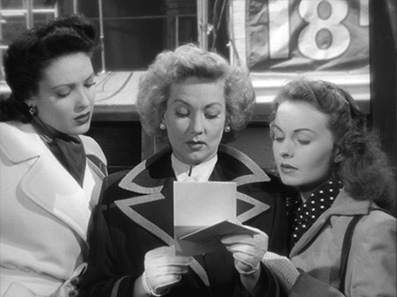
Three good friends are taking underprivileged children on a river trip picnic. These are the three eponymous 'wives'. Just before they leave any chance of communication on dry land, a letter is hand delivered to them, a letter from a fourth woman, the woman whose voice over we heard at the start. Addie Ross has personal claims on each of the three wives' husbands. Ross is that spectacular temptress who commands men's attention and it's a smart move that we never see her as each of us has an 'Addie Ross' firmly planted in our imaginations or if we're unlucky, in our memories. The letter underlines her friendship with all three wives until we get to page two in which she says that she's running off with one of their husbands. As the boat moves off, the three concerned women look wistfully at the public payphone on the dock...
Each of the marriages has its cracks to be exploited by a ruthless seductress and each of the women imagine what parts of their relationship would be vulnerable to the one woman who would take advantage of any weaknesses. Three flashbacks ensue in which we get to see the small but significant fractures in each marriage and how nervous the individual wives really are. Jeanne Crane and Jeffrey Lynn play Deborah and Brad Bishop. He's a member of America's elite, the upper class country club set whose lifestyles are predicated on wealth and privilege. His wife, once happily ensconced in the armed forces, an organisation that valued her and treated her well, is now out of uniform and feeling every second of her humble past. She has only herself to bolster a sinking ego while her burgeoning sense of inadequacy gets the better of her. A society event causes her some anxiety. She frets over her hair and whether the one and only decent dress she owns will see her through the evening without ridicule. Her husband, a kind but not overly sensitive soul, gives way to the wife of another couple (Ann Sothern as Rita) to help Deborah raise her game. Let's just say that things don't go well despite the herculean excess of martinis consumed. Deborah is convinced that Addie Ross is much more of a match for Brad than she can ever be.
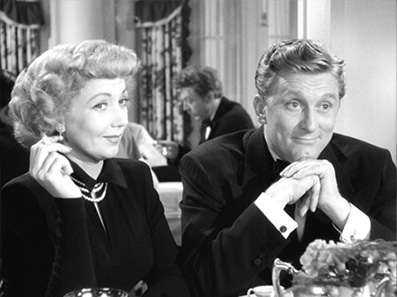
Lora Mae (Linda Darnell), in true Hollywood shortcut style, is known as the gold digger. Her marriage to the self made millionaire Porter (Paul Douglas) is based on her apparent need for 'stuff' and security. His unremitting and casual dismissal of his wife's feelings is based on knowing that a rich man will never find true love for obvious reasons. Boo fecking hoo. It's no secret to say that Porter is the man we enjoy disliking and Mankiewicz knows this and plays off these feelings very cleverly. Both husband and wife, unsurprisingly, are less than happy in their 'arrangement'. Lora too comes from a humble background. Her family's housekeeper, Sadie (played deliciously by Thelma Ritter, who is more famous to me as James Stewart's nurse in Hitchcock's Rear Window). Her rapport with the mother and her girls is priceless. In Lorna's flashback, we see how the rules of courtship and the demands of moneyed power can be subverted by something real and emotionally authentic. But still she has doubts about her catch. Addie Ross's come-hither finger is exerting a powerful spell...
Finally there's the Phipps. Rita is a career woman writing lucrative but commercially pandering soap operas for the radio. She supports her husband (in the late 40s, was this sacrilege of a kind, a woman supporting a man?) who has the more modest but honest job of schoolteacher. Played by a young but physically impressive Kirk Douglas, it's not hard to imagine that his character of George is not too many inches away from Mankiewicz's own. Like Lisa in The Simpsons, George is the character through which Mankiewicz can push his agenda and stopping for a moment to be reminded of Aaron Sorkin's parallel point of view, I lapped George up. With all the bullshit flying and his wife a card-carrying member of the Keep The Bullshit Aloft Club, it's refreshing to hear someone air some authentic spiel. They are hosting a dinner party for Mrs. Pretentious Radio Bigwig (not her real name) and her utterly under the thumb husband and despite George's wife's request that he keep a lid on the anti-bullshit tirade, he simply is incapable of doing so. After the flashbacks, once all three get wives off the boat, it's a race to find out which of the men has strayed and how to deal with the ensuing emotional wrench given the close-knit nature of the couples concerned.
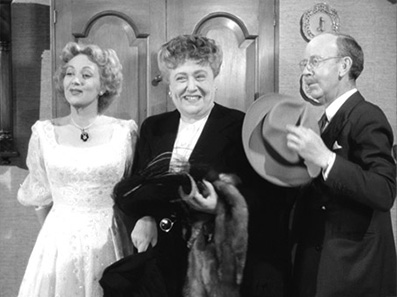
The movie is full of lovely moments, incidents that underline the dearth of subtlety in mainstream Hollywood fare. How we went from the feather touch to the pile-driving pound is a bizarre reversal of creative evolution unless social advancement is based on the lowest common denominator (which is what it seems to be). Subtlety these days is not showing a young woman slipping down the throat of a Mosasaur as she's gripped by the talons of a fleeing pteranodon which seconds later is clamped in the sea creature's jaws... As Deborah thinks "Is it Brad?" before we lose ourselves in her own flashback, the sound of the riverboat motor mimics the three words over and over. At first I thought this was a lovely touch but if you have one in a three-flashback movie, you have to have the others too which aren't quite as surprising or as subtlety done as the first. While necessary for consistency, the repeated lines "Why the blue suit?" and "Everything you want after all..." introducing the other two flashbacks don't have the same delightful surprise as the first. Jeanne Crain gives Richard E. Grant some serious competition in the Screen's Best Drunk Contest. Using martinis to steady her nerves (she must have a great many unsteady nerves), it's not long before Deborah is sloshed. I have no clue how she managed to say the following but say it with an inebriated panache she does... Talking about her Naval uniform, she says it's "...the great levelerlerler..." I still can't manage to repeat it. To help us dislike Porter even more, the older gruff businessman expounds about how much he loves 'class' in people and then stubs his cigar out in a glass of wine. Classy.
Mankiewicz is also, in his own way, an envelope pusher. He courted and wooed the censorship committee to push past some of his more risqué lines. It doesn't get any more so that this one... It's the most daring exchange of the film which happens in Rita's own night of hell with her employer and a husband bursting at the seams to tell the world what he thinks of his wife's acquiescence to bullshit. While at the dinner table, George (Kirk Douglas) listens to his wife's boss, played with authoritarian and teetotal relish by Florence Bates. On hearing that the housekeeper listens to the radio all day, she says "She's being penetrated." It's something of a shock and just in case we think the writer could not possibly be unaware of this extremely dodgy word (how it got through is a tribute to the charm of Mankiewicz, listen to the commentary), Douglas adds "Good thing she didn't hear you say that," as the older lady blunders on unaware of the double entendre... "After penetration comes saturation!" Oh my. Mankiewicz's less troublesome lines still scream wit and gently mockery. As Deborah tries to recover from her martinis, Rita offers her a fizzy pick-me-up. "What is it?" asks Deborah. "A new inner tube," says Rita. The milquetoast husband comes in for some ridicule too. As the radio bigwigs leave, he misquotes a bit of Latin to keep in with Douglas's schoolteacher. "Temple fugit, right professor?" "Almost..." says Douglas with a wry smile.
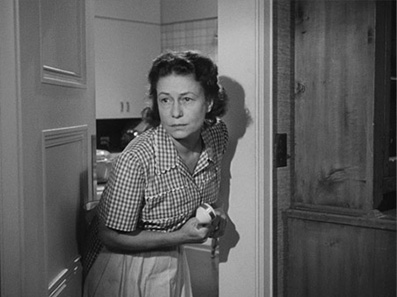
I could list many more moments that had me smiling but I'll leave those for you to find out. If you like your vintage movies with wit, class, subtlety and style (if a little unambitious on the visual aspect but then this isn't The Matrix after all) and let's not forget its humanistic heart proudly displayed on its sleeve, then A Letter To Three Wives is a real treat.
The 1.37:1 original aspect ratio is beautifully presented here, the 1080p resolution of a pristine print is fit to eat. I just love the fact you can see the weave on the men's suits. Just marvellous. I'm not sure whether it's a post-production digital clean up or a print that's been lovingly handled, either way, the print is close to faultless, virtually dust and scratch free. The blacks are solid, the grey range pleasing and you're never aware of any grain.
There are optional English subtitles for the deaf and hard-of-hearing.
The 5.1 surround soundtrack must mean the mono has been cleaned up (the dialogue is crisp and clear, somewhat important in a Joe Mankiewicz movie...) The sound still doesn't push the sub too much but there are some electronic effects that do benefit from being placed around the viewer rather than fired right at him/her from the centre.
Feature-length audio commentary with Mankiewicz biographer Kenneth Geist, film historian Cheryl Lower, and actor Christopher Mankiewicz, the director's son.
Three erudite and well-informed commentators deliver some wonderful detail and stories on the making of the film. I'm guessing but I feel like all three took their individual passes at the movie and then the most interesting parts were edited together. There's a moment when Geist mentioned a screen specific comment, specifically "There's Addie's arm – not Celeste's..." and the relevant arm doesn't appear on screen until a good twenty seconds later. I guess the commentary edit wasn't as easy as it should have been. I could regale you with my favourite nuggets but then, that's the lure of the commentary itself so no spoilers... Well, maybe just the one. Directors are fond of placing things in the actors' eye-lines unseen by the camera to generate an emotional response. Spielberg famously held up a blow up of Melinda Dillon's grandmother as she witnesses the majesty of the Close Encounters mothership for the first time. Her "Oh my God..." as she walks forward seems suitably naturalistic. Celeste Holm voices the barely glimpsed human catalyst of the movie, Addie Ross. But there are visual motifs of her all over the place. The photograph of this siren on the piano during a scene between Linda Darnell and Paul Douglas was played to with disdain from the former and an abiding wistfulness and longing by the latter. The fact that Mankiewicz inserted the photo of despised (by Darnell) director Otto Preminger pointed to some seriously good acting from Douglas. But then, Preminger may have been a picture to behold. Let me check... Uh, no.
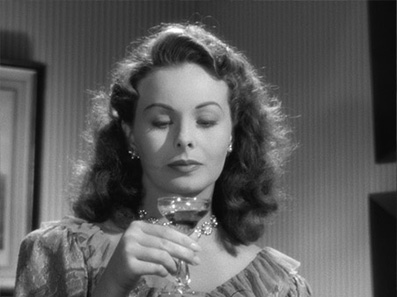
Fox Movietone newsreel covering the Academy Awards Ceremony (1' 15")
A snippet of the 22nd Academy Awards come to life via the black and white newsreel of the day. Complete with jaunty music, an unnaturally upbeat voice over artist and a strong vein of self-congratulatory silliness, here we have a very short glimpse at the man who scooped writing and directing gongs for A Letter To Three Wives. Mankiewicz has an eerie resemblance to Michael Portillo but maybe we should let that pass.
The Lux Radio Theatre Adaptation, 20th February 1950 (54' 38") and The Screen Guild Theatre Radio Adaptation 3rd November 1949 (29' 44")
Both are re-recordings of the meat of the movie – its screenplay, in both recordings truncated by significant amounts – and both work despite the absence of most of the original cast and the shorter running times. One wife and her husband from the movie made it to both radio performances, Linda Darnell and Paul Douglas. One of the two sponsors, Lux, made soap flakes that in 1949 were used by 90% of movie stars... Fall for that old chestnut if you dare. These recordings are glorious, albeit faded snapshots of history and how naive the 'Mad Men' of their day believed us to be. They were probably right. Advertising was in its infancy and the hard sell and the transparency of such ridiculously contrived and scripted interludes by the actors themselves just show how infantile advertising actually was after the war. The actors' ad spiel at the end of the second recording is the same as the Lux version with Camel products substituted. There is a certain level of performance that actors pull off when reading scripted lines they don't believe in and here it's a shock to me that people think this stuff actually works.
Can you imagine any actor today delivering dumb lines just to put a few shekels in his/her pocket? Unfortunately we can, can't we... I still cannot get over Harvey Keitel hawking insurance for Direct Line. On the same theme, at the Screen Guild Radio Theatre in 1950, here are the lyrics... "How mild, how mild, how mild can a cigarette be? Make the Camel 30-day test, and you'll see. Smoke Camels and see!!!" Jesus and that's the first thirty seconds of what is essentially the same as the Lux presentation (with the same two original stars). This was in the era when smoking was good for you. Yeah, right. "Make a note. Remember your throat..." Jesus. The ad break at 11 minutes reveals that the test smokers that prove Camel cigarettes do not hurt your throat smoked one to two packs a day. I could get emphysema just imagining a day smoking forty cigarettes. They made them hardy in the late 40s. The recordings bear up quite well but there are some crispy scratches on the Screen Guild recording and in the Lux, if there's any applause, you can forget trying to figure out what the presenter is saying. But, if you're a fan of the movie, these recordings have to be intriguing curios.
Original Theatrical Trailer (2' 43")
"Tell the world, it's a sheer delightful revelation!" Where do they get these copywriters? All the gossip columnists and media kings of the day are name-checked as this jaunty and leisurely paced example of its kind does its best to sell some class to the great unwashed.
36-page booklet containing essays, interview material, and rare archival imagery
This was sadly not available while reviewing but I'm going to assume it's a cracker.
A real gem from the late 40s and a great example of how sophisticated Hollywood could be. Joseph Mankiewicz's work as both writer and director is still relevant today despite his visual adherence to the proscenium arch (his love for the theatre is obvious and he never strays cinematically from presenting human beings with their faults and frailties front and centre but as if on stage). Not sure Orson Welles had too much to fear as a director but for biting satire, wit and sophistication, you can't go too far wrong with a Mankiewicz. Highly recommended for the discerning palette.
|